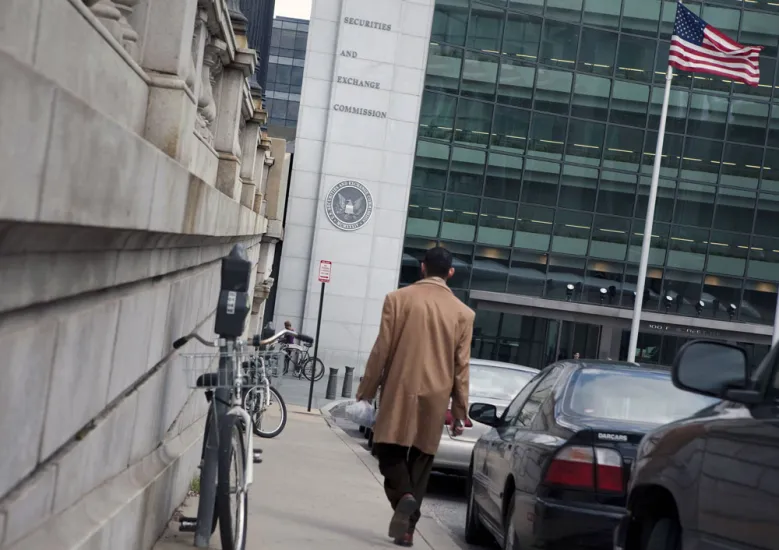Infinity Q Capital Management is gating redemptions and liquidating a fund portfolio after learning that its chief investment officer had been tinkering with pricing models, likely causing the firm to report incorrect valuations to investors.
In June, amid the precipitous drops of several volatility funds, James Velissaris, Infinity Q’s CIO and a principal owner, told Institutional Investor via email that the firm’s Volatility Alpha Fund had made gains during the first quarter of the year.
This response was cast in a new light on Monday after a Securities and Exchange Commission filing revealed that Infinity Q is working to determine whether the valuations it has been reporting to investors for a separate fund were correct.
A spokesperson for Infinity Q declined to comment on specific performance numbers Tuesday but said the firm is cooperating with an SEC investigation.
According to a statement from Infinity Q, the Securities and Exchange Commission told the firm’s non-executive chairman Len Potter late last week that SEC staff had found evidence that Velissaris had been altering the third-party valuation models for its $1.8 billion Diversified Alpha Fund. The firm said it had independently confirmed that Velissaris accessed and altered its third-party valuation models, but that it has not yet assessed the impact of those changes.
Infinity Q has since locked Velissaris out of its trading accounts and placed him on administrative leave, according to the statement.
In a statement Tuesday, Sean Hecker and Michael Ferrara, attorneys for Velissaris said, “Our client has acted in good faith throughout his tenure at Infinity Q and will continue to do so moving forward. His focus has always been on delivering and preserving value for investors.”
When asked by II in June about rumors that Infinity Q’s separate Volatility Alpha Fund had a substantial first-quarter drawdown, Velissaris said via email that the fund had gained 5.63 percent during that time period.
“Unlike many of [our] competitors, Infinity Q was net long vega and gamma heading into the event and was able to generate gains from this positioning,” Velissaris said in the June 17 email. He added that the firm has “historically generated positive performance during sharp declines in the S&P 500.”
According to Velissaris’ email, the fund was up 11.91 percent during the first quarter of 2018, when the S&P 500 index was down 1.22 percent. He added that the fund gained 5.65 percent in the fourth quarter of that year, when the S&P 500 fell 13.97 percent. He added that as of June 17, the fund had assets under management of over $1 billion and had experienced net inflows in 2020.
Meanwhile, the Infinity Q composite, which includes the Diversified Alpha Fund, had a year-to-date return of 9.7 percent through the end of September, according to a presentation available on Infinity Q’s now-archived website. The firm said in an SEC filing Monday that its Diversified Alpha Fund seeks exposure to volatility strategies, among others.
[II Deep Dive: How to Lose a Billion Dollars Without Really Trying]
In the statement Tuesday, Infinity Q said it is suspending all redemptions in its Diversified Alpha Fund, as well as certain private funds whose portfolios contain the same or similar derivative instruments.
In addition, Potter has assumed management of the firm, which has hired an independent expert to conduct a valuation of its portfolio and to oversee its liquidation.
Potter is the president and chief investment officer at Wildcat Capital Management, TPG founding partner David Bonderman’s $3 billion family office, his LinkedIn profile shows.
An archived version of Infinity Q’s website, which was taken offline amid the crisis, said that the firm is managed by Wildcat. However, a spokesperson for Infinity Q said that Wildcat “has never been involved in the day-to-day investment activities or valuation of Infinity Q funds.”
“Infinity Q was founded by and is majority owned and controlled by James Velissaris, who served as the chief investment officer and directed its day-to-day investment activities,” the spokesperson added.
Velissaris was previously a public investments portfolio manager at Wildcat Capital Management. While there, he managed the uncorrelated investment strategies that acted as a foundation for Infinity Q, according to an archived version of the firm’s website.
In September 2019, the Texas Municipal Retirement System allocated $125 million to the firm’s volatility alpha fund, meeting minutes show. The State Teachers Retirement System of Ohio also lists Infinity Q among its investment managers, a 2020 annual report shows. Neither returned emails seeking comment.
—Leanna Orr contributed to this reporting.







